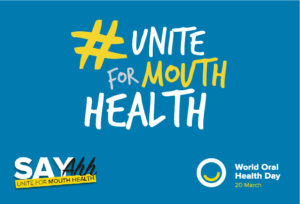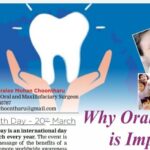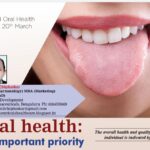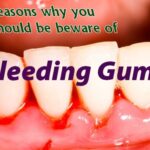Oral health for holistic well-being should be considered as a major health issue at primary healthcare level itself. World Oral Health Day (WOHD) is celebrated every year on 20 March and there is a dire need to make it as a major health issue at primary healthcare level itself.


When the question is asked: name some most common non-communicable diseases, it is usual to recollect names such as diabetes, cancer, and hypertension; very rarely does one say – oral cavity diseases. The authoritative body on health, WHO (World Health Organization) states oral disease is one of the most common non-communicable disease that affects people of all age groups, throughout the lifetime causing pain, discomfort, disfigurement and even death. Problems of dental health result in loss of self-confidence, self-esteem, introverted nature and consequent loss in social well-being, and finally, at times, loss of socialization opportunities and job prospects. Non-communicable oral disease impacts 360-degree lifestyle including work life.
Dental disease normally covers teeth and gums, while oral health is a more broad-based term encompassing oral cancer, oral diseases due to HIV, cleft lip and palate, and noma. The last one – noma, is an infectious disease in which cell death occurs, flesh eating bacteria cause great harm, seen mainly in poor African countries, sufferers have weak immunity and suffer extreme malnutrition. Untreated noma leads to severe gum disease and even death.
Oral health is crucial for daily living:
Eating, speaking, smiling, tasting, and socializing are all dependent on a healthy oral cavity. Gum infection and dental caries or tooth decay are common oral health problems, and these disrupt normal living. Sleep disturbance and lowered productivity are a consequence of oral medical problems. Due to oral problems people find it difficult to consume choice foods, and eating habits change. Elderly subjects with reduced number of teeth and weak teeth give up hard foods and choose only soft foods. Due to poor dental health, diet and nutrition are affected and this worsens general health. Dental disease complications destroy soft tissues in mouth cavity, and can lead to major problems including death. Dental disease and poor oral health leads to decreased social activity, it affects how a person looks and sounds. As dental health issues are normally addressed to with seriousness, it is not an exaggeration to call oral disease as a ‘silent epidemic’.
Children are more vulnerable to ill effects of oral health:
If a child lacks dental or oral health, participation in classroom activities, learning, group assignments and overall schooling is below par – this affects child development right upto adulthood. Lack of social skills due to oral or dental problems creates a chaotic adulthood for the child. Eating and nutrition problems are more in children with poor oral health. Three year old children with nursing caries, weighed about 1 kg less than control or normal children – as per a study, as toothache and infection alter eating habits, sleep cycle, diet, metabolism and weight gain. Oral health seemingly an innocuous and not so serious malady is actually a major NCD with far reaching consequences affecting child growth, career, and matrimonial, family, social and professional life.
WHO has taken note of this serious affliction and has given a comprehensive definition of oral health: “a state of being free from chronic mouth and facial pain, oral and throat cancer, oral infection and sores, periodontal (gum) disease, tooth decay, tooth loss, and other diseases and disorders that limit an individual’s capacity in biting, chewing, smiling, speaking, and psychosocial wellbeing”.
While lack of use of oral care products affects oral health, lifestyle factors such as tobacco, alcohol, and high sugars in food worsen the problems. In case of weak immunity patients and diabetics, susceptibility to these health problems including gum disease is more. Abscesses and poor wound healing of gum sores is a challenge in diabetics. Low fluoride toothpastes are safe to use and provide protection from dental caries.
There is a need to make oral health a major health issue:
Oral and general health are integral to each other. There is a dire need to make it as a major health issue at primary healthcare level itself. Infections in mouth can infect other internal organs too, similarly infections from other areas can infect oral cavity. Poor dental health, gum disease and mouth infections lead to heart disease. Other gum disease complications include respiratory problems, premature birth, complications at birth, and stroke. Poorly controlled blood sugar levels in diabetics causes gum disease. Australia has hence declared in its national health policy: oral health is fundamental to overall health, well-being and quality of life. In short, it is wise to brush minimum twice a day, and also gargle mouth frequently particularly after food intake.


Sunil S Chiplunkar
M Pharm (Pharmacology) MBA (Marketing) PGDHRM
VP-Business Development
Group Pharmaceuticals,Bengaluru
Ph: 6364578669
sunilchiplunkar@gmail.com











